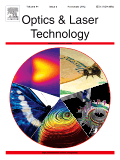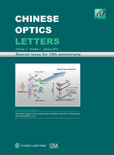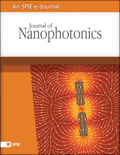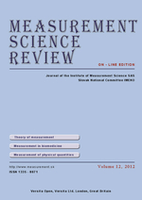
Optoelectronics Instrumentation and Data Processing
metrics 2024
Driving Excellence in Instrumentation for Tomorrow's Technologies
Introduction
Optoelectronics Instrumentation and Data Processing is a cutting-edge academic journal published by Springer, dedicated to the multidisciplinary field of optoelectronics, providing a platform for researchers, professionals, and students to publish pivotal advancements in instrumentation and data processing techniques related to light-based technologies. Established in 1984, this journal has fostered the sharing of innovative research, facilitating knowledge transfer and collaboration across various scientific domains, particularly in condensed matter physics and electrical engineering. Although it currently holds a Q4 ranking in its respective categories, its open-access policy and commitment to excellence are geared towards elevating research visibility, thus encouraging contribution and dissemination of impactful findings. With a focus on promoting advancements from 2011 to 2024, this journal serves as an invaluable resource for those at the forefront of optoelectronic applications, positioning itself as a significant player within the academic community.
Metrics 2024
 0.21
0.21 0.50
0.50 0.50
0.50 14
14Metrics History
Rank 2024
Scopus
IF (Web Of Science)
JCI (Web Of Science)
Quartile History
Similar Journals

Journal of Instrumentation
Pioneering research that shapes the landscape of instrumentation.Journal of Instrumentation, published by IOP Publishing Ltd, stands at the forefront of the fields of instrumentation and mathematical physics, playing a crucial role in advancing the knowledge and practice within these domains. With an ISSN of 1748-0221 and an esteemed position as a Q2-ranked journal in both categories as of 2023, it showcases high-quality research and innovative findings that contribute to the broader scientific community. Operating since 2006, this journal facilitates the dissemination of cutting-edge developments and interdisciplinary approaches in measurement techniques and their applications, making it a vital resource for researchers, professionals, and students alike. The journal maintains a competitive edge, ranked in the 59th percentile in mathematical physics and the 35th percentile in instrumentation according to Scopus rankings, reflecting its commitment to quality and impact. With a focus on accessible scientific communication, the Journal of Instrumentation is dedicated to nurturing a collaborative environment that promotes the integration of theoretical advancements and practical issues, providing an essential platform for sharing vital research discoveries.

Photonics, an esteemed journal published by MDPI, is a leading platform for researchers in the fields of atomic and molecular physics, optics, and instrumentation. Since its inception in 2014, the journal has fostered open access to cutting-edge research, facilitating knowledge dissemination in these dynamic disciplines. With its Q2 ranking in the 2023 Scopus metrics for various categories, including radiology, nuclear medicine, and imaging, Photonics represents a crucial academic resource for professionals and students seeking to advance their understanding and expertise. Located in Basel, Switzerland, the journal plays a pivotal role in bridging theoretical and practical approaches to photonic technologies. Researchers are encouraged to contribute their findings, thereby enriching the journal’s impact and relevance in the global scientific community through collaboration and innovation.

OPTICS AND LASER TECHNOLOGY
Transforming Knowledge into Laser SolutionsOPTICS AND LASER TECHNOLOGY, published by Elsevier Science Ltd, is a premier journal dedicated to advancing knowledge in the fields of optics and laser applications. With its impressive Q1 rankings across three critical categories—Atomic and Molecular Physics, and Optics; Electrical and Electronic Engineering; and Electronic, Optical and Magnetic Materials—the journal stands at the forefront of scientific discourse, boasting a significant impact factor that underscores its relevance. Since its inception in 1970, the journal has consistently provided a platform for the dissemination of cutting-edge research, key innovations, and reviews that influence both academic study and practical applications. Although it currently does not have open access options, its rigorous peer-review process and inclusion in esteemed indexing services make it a valuable resource for researchers, professionals, and students seeking to stay informed about the latest developments in optics and laser technology. The journal’s ongoing commitment to quality research ensures it remains a vital publication for those engaged in this dynamic field, with a converged projection extending through 2025.

Optics
Unveiling the Wonders of Light and Its ApplicationsOptics is a pioneering open access journal published by MDPI, dedicated to advancing the field of optics and photonics. Since its inception in 2020, the journal has fostered the dissemination of high-quality research and innovative developments in optical sciences, contributing significantly to its community of researchers, professionals, and students in Switzerland and beyond. With an impact factor reflective of its growing prominence, Optics strives to address a diverse scope, encompassing atomic and molecular physics, electronic materials, and broader topics in physics and astronomy. The journal's commitment to open access ensures that cutting-edge research is freely available, promoting collaboration and knowledge-sharing across disciplines. As of 2023, it holds a Q4 ranking in several categories, including Atomic and Molecular Physics, and Optics, which illustrates its evolving role in the academic landscape, positioning it as a valuable resource for those seeking to explore the frontiers of optical technology and its applications.

Chinese Optics Letters
Catalyzing collaboration in optical science.Chinese Optics Letters is a prestigious academic journal published by Chinese Laser Press, dedicated to advancing the fields of atomic and molecular physics, optics, as well as electrical and electronic engineering. Since its inception in 2003, this journal has become a significant platform for researchers and professionals to disseminate innovative findings and foster collaboration within these rapidly evolving disciplines. With a commendable Q2 ranking in leading categories including Atomic and Molecular Physics and Electronic, Optical and Magnetic Materials, it ranks favorably within the Scopus database, with notable positions in both engineering and materials science sectors. The journal is headquartered in Shanghai, China, and while additional open access options are not specified, it remains a vital resource for those committed to pushing the frontiers of optical research and applications. As we approach 2024, Chinese Optics Letters continues to play an essential role in shaping scholarly discourse and technological advancement in optics.

Journal of Nanophotonics
Transforming Ideas into Nanophotonic RealitiesThe Journal of Nanophotonics, published by SPIE-SOC Photo-Optical Instrumentation Engineers, is an esteemed platform dedicated to advancing the field of nanotechnology through pioneering research in photonics. Since its inception in 2007, this journal has become instrumental in disseminating innovative findings and fostering collaborative discussions, especially in the domains of Condensed Matter Physics, Electronic, Optical and Magnetic Materials, and Nanoscience and Nanotechnology. Currently ranked within the Q3 category across these fields, it serves as a vital resource for academics, industry professionals, and students keen on exploring the multifaceted applications and implications of nanophotonic technologies. With its convergence set to continue until 2024, the journal offers a non-open-access model, ensuring rigorous peer-review standards and high-quality publications that contribute to the global body of knowledge.

OPTICAL REVIEW
Innovating Insights in the World of LightOPTICAL REVIEW is a distinguished journal published by the Optical Society of Japan that serves as a critical platform for researchers, professionals, and students within the diverse fields of atomic and molecular physics and optics. With its ISSN 1340-6000 and E-ISSN 1349-9432, the journal has had a significant impact on the dissemination of knowledge since its inception in 1994, with a planned coverage until 2024. Although it currently holds a Q4 ranking in the 2023 category quartiles and is positioned at rank #152 out of 224 in the Scopus database, its contributions are vital for advancing optical science. This journal provides a venue for innovative research, review articles, and significant developments that drive the optical sciences forward. Although not categorized as Open Access, it remains an important resource for those seeking to deepen their knowledge and engage with leading-edge research in optics. With its base located at the Kudan-Kita Building in the heart of Tokyo, Germany, OPTICAL REVIEW is poised to continue fostering scholarly communication and collaboration on a global scale.

Optica Pura y Aplicada
Illuminating Innovations in Optics and MaterialsOptica Pura y Aplicada, published by the SOC ESPANOLA OPTICA, stands as a vital platform for the dissemination of cutting-edge research in the fields of Atomic and Molecular Physics, Optics, and related engineering disciplines. Established in Spain, this journal aims to foster the advancement of knowledge in optical science and technology by providing a rigorous peer-reviewed publication outlet for scholars, researchers, and practitioners. Despite being categorized in the Q4 quartile across multiple domains, including Engineering and Materials Science, the journal remains committed to contributing meaningful insights and advancements within its scope. With an ISSN of 0030-3917 and an E-ISSN of 2171-8814, the journal effectively reaches a global audience eager to explore innovative applications and theoretical developments in optics and materials science. Researchers and professionals alike will find in Optica Pura y Aplicada a valuable resource for enriching their understanding and practices in an ever-evolving field, fostering collaborations and promoting research growth until its converged conclusion in 2024.

Nonlinear Optics Quantum Optics-Concepts in Modern Optics
Advancing Knowledge in Nonlinear and Quantum OpticsNonlinear Optics Quantum Optics-Concepts in Modern Optics is a specialized journal published by OLD CITY PUBLISHING INC, focusing on the forefront of research in nonlinear optics and quantum optics. With an ISSN of 1543-0537 and an E-ISSN of 1944-8325, this journal serves as a pivotal platform for the dissemination of innovative concepts and findings in modern optics, significant for both theoretical exploration and practical applications. Established in 2003, the journal's scope encompasses critical areas such as atomic and molecular physics, optical materials, and instrumentation, attracting submissions from a diverse range of interdisciplinary fields. While the journal currently maintains a Q4 ranking in several categories, it continues to strive for higher visibility and impact in the academic community. Researchers and students alike will find valuable insights and contributions that foster advancements in optical science and engineering. With an emphasis on rigorous peer-review, Nonlinear Optics Quantum Optics-Concepts in Modern Optics is committed to enhancing the understanding and application of nonlinear optical phenomena in various technological domains.

Measurement Science Review
Bridging Disciplines through Measurement ExcellenceMeasurement Science Review is a distinguished open-access journal published by SCIENDO, dedicated to advancing the field of measurement science across various disciplines, including Biomedical Engineering, Control and Systems Engineering, and Instrumentation. Since its inception in 2008, it has actively contributed to the dissemination of innovative research and practices relevant to these fields, currently holding a notable Q3 ranking in its category as per the 2023 metrics. With an emphasis on robust scientific inquiry and practical applications, Measurement Science Review is positioned as an essential resource for researchers, professionals, and students seeking to enhance their understanding and expertise in measurement technologies. The journal provides an accessible platform for interdisciplinary dialogue and collaboration, making it a vital component of the academic landscape in Slovakia and beyond. Its publication track extends to 2024, ensuring timely access to cutting-edge research findings for a global audience.